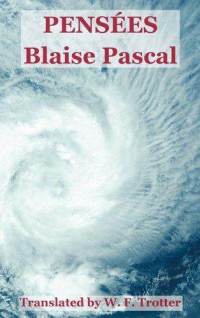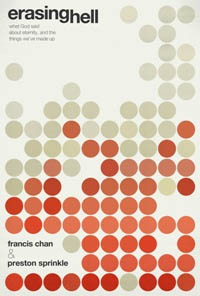 Pensées is a collection of thoughts, from French mathematician and philosopher Blaise Pascal. In many ways Pascal was an early post-modernist thinker, perceiving and challenging (successfully) not only principles in mathematics and physical sciences, but in the philosophical and religious realms as well. The Pensées (which literally means “thoughts”) is not a completed book, but a point-style outline of important thoughts, that read more like proverbs than treatise. The work was published posthumously and is missing a readable flow from thought to thought.
Pensées is a collection of thoughts, from French mathematician and philosopher Blaise Pascal. In many ways Pascal was an early post-modernist thinker, perceiving and challenging (successfully) not only principles in mathematics and physical sciences, but in the philosophical and religious realms as well. The Pensées (which literally means “thoughts”) is not a completed book, but a point-style outline of important thoughts, that read more like proverbs than treatise. The work was published posthumously and is missing a readable flow from thought to thought.
However, the concepts presented in Pensées are quite clear- they are a philosophical apologetic for the Christian faith. In Section III of the work (titled “the necessity of the wager”) Pascal clarifies his intention to speak directly to a specific group of people:
A letter to incite to the search after God. And then to make people seek Him among the philosophers, sceptics, and dogmatists, who disquiet him who inquires of them.[1]
From this point, Pascal lays out a logical progression of deconstructing arguments against Christianity. However, Pascal is not saying that logic or reason as the answers to finding God. In fact, his premise is that reason will not be able to lead you through its processes to knowledge of God. He uses philosophy and reason to counter the notion that reason is a singular tool to concluding God exists- this dichotomoy is not lost on Pascal and he tries to reconcile this by such paradoxical renderings as :
Submission.--We must know where to doubt, where to feel certain, where to submit. He who does not do so, understands not the force of reason.[2]
and
If we submit everything to reason, our religion will have no mysterious and supernatural element. If we offend the principles of reason, our religion will be absurd and ridiculous.[3]
In the midst of his musing about reason and heart (the contrast of the two), Pascal famously pens the phrase “The heart has its reasons, which reason does not know.”[4] But he winds that discussion eventually around to a simple, clear and understandable summation: “Heart, instinct, principles.”[5]
He tackles a number of topics including integrity of searching for God to the seriousness of eternity and the scope of human lifespan. At almost every turn, Pascal uses the insights of a scientific mindset (along with its proofing mechanisms) to first examine a topic and then lead you to a conclusion. This progression is sprinkled generously with several “proverb-like” sentences in which he levels basic human truths in seeming juxtaposition to the more straightforward point-building scheme of proofing his opinions. Occasionally, he also uses a dialogical counterplay of asking us to imagine things about one position and then asking questions about himself, all the while inferring an obvious point toward the validation of the Christian position as a logical premise.
But it is the punctual proverbs that surprise most readers, for example:
Instability- it is a horrible thing to feel all that we possess slipping away. 213 Between us and heaven or hell there is only life, which is the frailest thing in the world.[6]
One of the most well known portions of Pensées is an argument that is popularly called “Pascal’s Wager”. This proposal is basically a logical explanation for why it would be unreasonable to not believe in God. Through using his wager, he hopes that intellectual people will consider believing in God to be a proper “wager” to take.
In a summary of proofs on believing in God the author gives yet another dailogical possibility:
Two kinds of persons know Him: those who have a humble heart, and who love lowliness, whatever kind of intellect they may have, high or low; and those who have sufficient understanding to see the truth, whatever opposition they may have to it.[7]
Pascal comes to this point, saying that people may come to God through the mind or the heart, and both are acceptable and not to be shunned.
Amazon Product Link: http://amzn.to/rFEhfy
Review by Kim Gentes
[1]Blaise Pascal, “Pascal's Pensées ”, (Public Domain Books, Kindle Edition), Pg. 53
[2]Ibid., Pg. 78
[3]Ibid., Pg. 79
[4]Ibid., Pg. 80
[5]Ibid., Pg. 81
[6]Ibid., Pg. 63
[7]Ibid., Pg. 83
 Kim Gentes |
Kim Gentes |  5 Comments |
5 Comments |  apologetics,
apologetics,  chan,
chan,  erasing hell,
erasing hell,  francis chan,
francis chan,  hell,
hell,  love wins,
love wins,  rob bell,
rob bell,  universalism in
universalism in  Apologetics,
Apologetics,  Bible,
Bible,  Book Review,
Book Review,  Church,
Church,  Grief,
Grief,  Jesus,
Jesus,  Leadership,
Leadership,  Loss,
Loss,  Postmodern,
Postmodern,  Theology
Theology 
